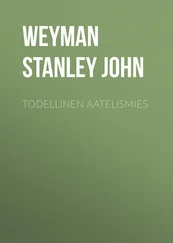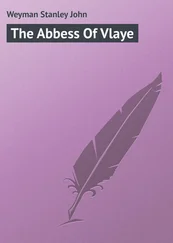Stanley Weyman - The Red Cockade
Здесь есть возможность читать онлайн «Stanley Weyman - The Red Cockade» — ознакомительный отрывок электронной книги совершенно бесплатно, а после прочтения отрывка купить полную версию. В некоторых случаях можно слушать аудио, скачать через торрент в формате fb2 и присутствует краткое содержание. Жанр: foreign_prose, на английском языке. Описание произведения, (предисловие) а так же отзывы посетителей доступны на портале библиотеки ЛибКат.
- Название:The Red Cockade
- Автор:
- Жанр:
- Год:неизвестен
- ISBN:нет данных
- Рейтинг книги:4 / 5. Голосов: 1
-
Избранное:Добавить в избранное
- Отзывы:
-
Ваша оценка:
- 80
- 1
- 2
- 3
- 4
- 5
The Red Cockade: краткое содержание, описание и аннотация
Предлагаем к чтению аннотацию, описание, краткое содержание или предисловие (зависит от того, что написал сам автор книги «The Red Cockade»). Если вы не нашли необходимую информацию о книге — напишите в комментариях, мы постараемся отыскать её.
The Red Cockade — читать онлайн ознакомительный отрывок
Ниже представлен текст книги, разбитый по страницам. Система сохранения места последней прочитанной страницы, позволяет с удобством читать онлайн бесплатно книгу «The Red Cockade», без необходимости каждый раз заново искать на чём Вы остановились. Поставьте закладку, и сможете в любой момент перейти на страницу, на которой закончили чтение.
Интервал:
Закладка:
"Take the lead and govern?" he rejoined. "By whom? A handful of servants and game-keepers? Against the people? against such a mob as you saw in the Square at Cahors? Impossible, Monsieur."
"But the world seems to be turning upside down," I said helplessly.
"The greater need of a strong unchanging holdfast-not of the world," he answered reverently; and he lifted his hat a moment from his head and stood in thought. Then he continued: "However, the matter is this. I hear from Doury that the gentry are gathering at Cahors, with the view of combining, as you suggest, and checking the people. Now, it must be useless, and it may be worse. It may lead to the very excesses they would prevent."
"In Cahors?"
"No, in the country. Buton, be sure, did not speak without warrant. He is a good man, but he knows some who are not, and there are lonely châteaux in Quercy, and dainty women who have never known the touch of a rough hand, and-and children."
"But," I cried aghast, "do you fear a Jacquerie?"
"God knows," he answered solemnly. "The fathers have eaten sour grapes, and the children's teeth are set on edge. How many years have men spent at Versailles the peasant's blood, life, bone, flesh! To pay back at last, it may be, of their own! But God forbid, Monsieur, God forbid. Yet, if ever-it comes now."
When he was gone I could not rest. His words had raised a fever in me. What might not be afoot, what might not be going on, while I lay idle? And, presently, to quench my thirst for news, I mounted and rode out on the way to Cahors. The day was hot, the time for riding ill-chosen; but the exercise did me good. I began to recover from the giddiness of thought into which the Curé's fears, coming on the top of Buton's warning, had thrown me. For a while I had seen things with their eyes; I had allowed myself to be carried away by their imaginations; and the prospect of a France ruled by a set of farriers and postillions had not seemed so bizarre as it began to look, now that I had time, mounting the long hill, which lies one league from Saux and two from Cahors, to consider it calmly. For a moment, the wild idea of a whole gentry fleeing like hares before their peasantry, had not seemed so very wild.
Now, on reflection, beginning to see things in their normal sizes, I called myself a simpleton. A Jacquerie? Three centuries and more had passed since France had known the thing in the dark ages. Could any, save a child alone in the night, or a romantic maiden solitary in her rock castle, dream of its recurrence? True, as I skirted St. Alais, which lies a little aside from the road, at the foot of the hill, I saw at the village-turning a sullen group of faces that should have been bent over the hoe; a group, gloomy, discontented, waiting-waiting, with shock heads and eyes glittering under low brows, for God knows what. But I had seen such a gathering before; in bad times, when seed was lacking, or when despair, or some excessive outrage on the part of the fermier , had driven the peasants to fold their hands and quit the fields. And always it had ended in nothing, or a hanging at most. Why should I suppose that anything would come of it now, or that a spark in Paris must kindle a fire here?
In fact, I as good as made up my mind; and laughed at my simplicity. The Curé had let his predictions run away with him, and Buton's ignorance and credulity had done the rest. What, I now saw, could be more absurd than to suppose that France, the first, the most stable, the most highly civilised of States, wherein for two centuries none had resisted the royal power and stood, could become in a moment the theatre of barbarous excesses? What more absurd than to conceive it turned into the Petit Trianon of a gang of rôturiers and canaille?
At this point in my thoughts I broke off, for, as I reached it, a coach came slowly over the ridge before me and began to descend the road. For a space it hung clear-cut against the sky, the burly figure of the coachman and the heads of the two lackeys who swung behind it visible above the hood. Then it began to drop down cautiously towards me. The men behind sprang down and locked the wheels, and the lumbering vehicle slid and groaned downwards, the wheelers pressing back, the leading horses tossing their heads impatiently. The road there descends not in lacets , but straight, for nearly half a mile between poplars; and on the summer air the screaming of the wheels and the jingling of the harness came distinctly to the ear.
Presently I made out that the coach was Madame St. Alais'; and I felt inclined to turn and avoid it. But the next moment pride came to my aid, and I shook my reins and went on to meet it.
I had scarcely seen a person except Father Benôit since the affair at Cahors, and my cheek flamed at the thought of the rencontre before me. For the same reason the coach seemed to come on very slowly; but at last I came abreast of it, passed the straining horses, and looked into the carriage with my hat in my hand, fearing that I might see Madame, hoping I might see Louis, ready with a formal salute at least. Politeness required no less.
But sitting in the place of honour, instead of M. le Marquis, or his mother, or M. le Comte, was one little figure throned in the middle of the seat; a little figure with a pale inquiring face that blushed scarlet at sight of me, and eyes that opened wide with fright, and lips that trembled piteously. It was Mademoiselle!
Had I known a moment earlier that she was in the carriage and alone, I should have passed by in silence; as was doubtless my duty after what had happened. I was the last person who should have intruded on her. But the men, grinning, I dare say, at the encounter-for probably Madame's treatment of me was the talk of the house-had drawn up, and I had reined up instinctively; so that before I quite understood that she was alone, save for two maids who sat with their backs to the horses, we were gazing at one another-like two fools!
"Mademoiselle!" I said.
"Monsieur!" she answered mechanically.
Now, when I had said that, I had said all that I had a right to say. I should have saluted, and gone on with that. But something impelled me to add-"Mademoiselle is going-to St. Alais?"
Her lips moved, but I heard no sound. She stared at me like one under a spell. The elder of her women, however, answered for her, and said briskly: —
"Ah, oui , Monsieur."
"And Madame de St. Alais?"
"Madame remains at Cahors," the woman answered in the same tone, "with M. le Marquis, who has business."
Then, at any rate, I should have gone on; but the girl sat looking at me, silent and blushing; and something in the picture, something in the thought of her arriving alone and unprotected at St. Alais, taken with a memory of the lowering faces I had seen in the village, impelled me to stand and linger; and finally to blurt out what I had in my mind.
"Mademoiselle," I said impulsively, ignoring her attendants, "if you will take my advice-you will not go on."
One of the women muttered " Ma foi! " under her breath. The other said "Indeed!" and tossed her head impertinently. But Mademoiselle found her voice.
"Why, Monsieur?" she said clearly and sweetly, her eyes wide with a surprise that for the moment overcame her shyness.
"Because," I answered diffidently-I repented already that I had spoken-"the state of the country is such-I mean that Madame la Marquise scarcely understands perhaps that-that-"
"What, Monsieur?" Mademoiselle asked primly.
"That at St. Alais," I stammered, "there is a good deal of discontent, Mademoiselle, and-"
"At St. Alais?" she said.
"In the neighbourhood, I should have said," I answered awkwardly. "And-and in fine," I continued very much embarrassed, "it would be better, in my poor opinion, for Mademoiselle to turn and-"
Читать дальшеИнтервал:
Закладка:
Похожие книги на «The Red Cockade»
Представляем Вашему вниманию похожие книги на «The Red Cockade» списком для выбора. Мы отобрали схожую по названию и смыслу литературу в надежде предоставить читателям больше вариантов отыскать новые, интересные, ещё непрочитанные произведения.
Обсуждение, отзывы о книге «The Red Cockade» и просто собственные мнения читателей. Оставьте ваши комментарии, напишите, что Вы думаете о произведении, его смысле или главных героях. Укажите что конкретно понравилось, а что нет, и почему Вы так считаете.












